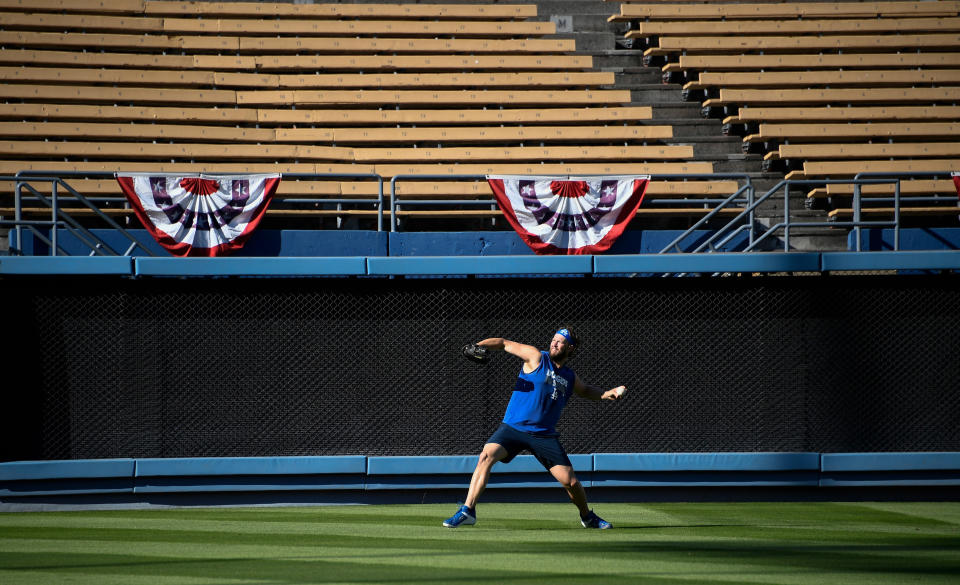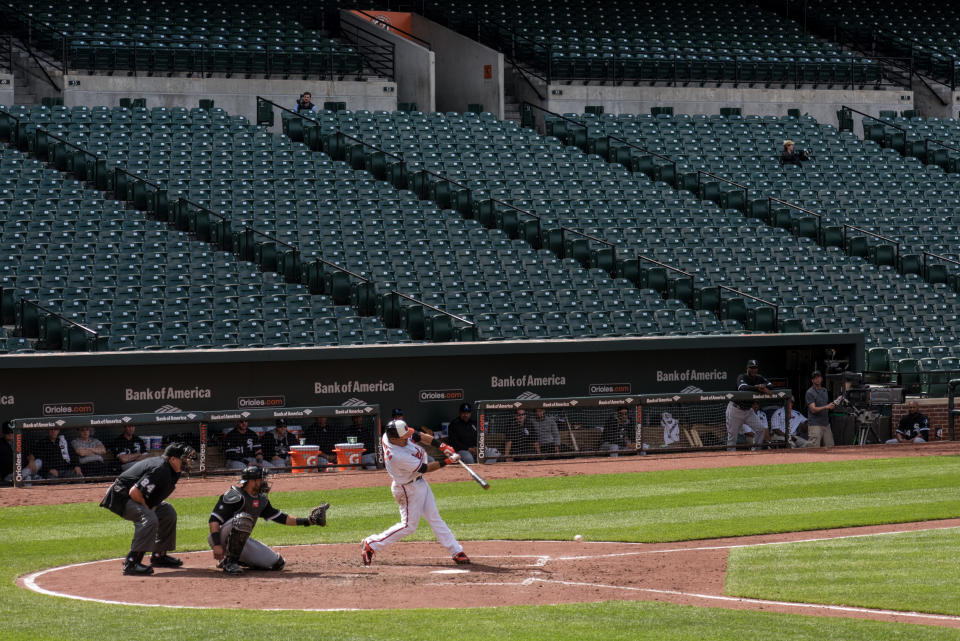Should MLB plan to play without fans amid coronavirus threat?

Around camps in Florida and Arizona, baseball teams are beginning to confront the growing threat of the coronavirus. Incremental measures have included discouraging high-fives, pre-signed cards and balls being tossed to fans from a safe distance, bulletins around clubhouses reminding players and personnel to wash their hands and stay home if feeling under the weather.
For the most part, beyond acknowledging these accommodations, baseball players seem largely unconcerned about the impact the coronavirus and its resulting COVID-19 disease will have on their daily lives. As young, healthy men with abundant access to medical professionals, they’re unlikely to get sick or have severe symptoms if they do.
But to think baseball will be unaffected just because the players won’t be would be a misunderstanding of the threat such an epidemic poses. The commitment to promoting best practices within clubhouses is admirable, but effectively moot in comparison to crowding tens of thousands of far less carefully monitored people into stadiums around the country starting in just a few weeks. It’s not the players who are at the greatest risk when the coronavirus comes for baseball; it’s the fans.
A list of large gatherings that have been canceled because of the outbreak, which could soon be labeled a pandemic, will be outdated within hours of publication: Umpteen obscure conferences, South by Southwest, Ireland’s St. Patrick’s Day Parade, the BNP Paribas Open, a European Tour golf event in Kenya, the women’s world hockey championships in Canada, the early part of Japan’s Nippon Professional Baseball league season, literally all sports in Italy until further notice.
When canceling isn’t tenable and a half-measure is, sporting events are conducted in relative isolation. Fans have been banned from games in the Champions League and various domestic European soccer leagues, as well as rugby matches. Division III NCAA basketball tournament games were held at an empty venue as Johns Hopkins’ arena was closed to fans this past weekend.
LeBron James made headlines for voicing his displeasure with an NBA directive telling teams to prepare to play in empty arenas.
After a call between league officials and team owners on Monday afternoon, Major League Baseball joined the NBA and NHL in closing clubhouses to the media but intends to complete spring training and open the season as scheduled — with fans in attendance. The caveat, of course, is that the situation could change between now and opening day on March 26. While the league is working with federal agencies like the Centers for Disease Control and Prevention, clubs are already in communication with their respective local governments, and once teams return to the home cities, some of these considerations will be handled on a case-by-case basis. Teams in Seattle and California, for instance, have more acute concerns than those in the middle of the country.
Are empty ballparks better for public health?
The league’s ultimate calculus regarding attendance in the time of the coronavirus will include careful consideration of the incredible financial loss and cultural impact of conceding ticket and concession sales and the energy of full stadiums to the epidemic — but what about exclusively from a public health standpoint? Should Major League Baseball consider barring fans from games on opening day and beyond?
“It is an effective infection control mitigation strategy. There's no question about that,” said Cameron Wolfe, associate professor of medicine in the division of infectious diseases at Duke University health system.
While not as contagious as some historic epidemics — “I’d much rather sit next to the person that has coronavirus than measles,” Wolfe said — the coronavirus possesses a couple of key characteristics that makes big venues like baseball stadiums particularly dangerous. First, that it has a better ability than something like the flu to survive on surfaces outside the body. And, critically, that a lot of infected people don’t know that they are.
“I think what's becoming clear is that for younger, healthier individuals, they don't necessarily feel super sick. And so they may not feel sick enough to give up their basketball ticket, or the first game of the Mets,” Wolfe said. “And so they’ll show up, unaware that the 80-year-old that’s got the ticket beside them is actually much more prone for a much more severe outcome should they get the virus as a result.”
In the past, MLB has canceled or postponed games as a result of terrorist attacks and natural disasters; but only one game in recent history was played in front of fully empty grandstands. When the Chicago White Sox played the Orioles in Baltimore in 2015 amidst civil unrest, the league banned fans from attending.
“It was a completely different situation. I wouldn’t say they correlate together,” said Giants pitcher Jeff Samardzija, who started that game for the White Sox. He’s right. That was one game for one team. An epidemic-induced lockdown would likely be league-wide and prolonged.

“I just think you have to be really careful when you start playing games with no fans because we go out there to entertain and perform in front of a lot of people,” Samardzija continued. “Obviously health is first and playing games is second, so we just need to make sure everything’s taken care of and wrapped up so people can come enjoy these games. But I wouldn’t recommend playing them in empty stadiums.”
Of course, Samardzija’s sentiment is the more sympathetic one. Fans want to go to baseball games — especially if they don’t feel aggressively ill and the threat seems distant and abstract. The raw number of reported cases is a tiny fraction of total populations. But that’s why it might be necessary to protect people from themselves.
Large gatherings could be especially dangerous in U.S.
While European and Middle Eastern countries have already proven more readily willing to lock down communities and close the doors to public events, the United States is actually uniquely vulnerable to letting the coronavirus spread unchecked.
The United States was slow to adopt testing and is still not producing enough tests to meet national demands, according to a Politico report, has different testing capacities state to state, and is obfuscating crucial testing data. Anecdotal evidence shows that even people who believe or have reason to believe that they may have the virus are struggling to get tested, and certainly aren’t able to get the test in a timely fashion. Combined with the relatively mild symptoms they experience (to say nothing of our country’s lack of standardized paid medical leave), young and otherwise healthy adults who contract the coronavirus are liable to continue to go about their lives, infecting others without knowing that they’re sick and contagious.
“In the non-ideal world where I can't quickly identify everyone who's positive and get them out of the way of others who may be more at risk than them,” Wolfe said, “then you have to start thinking about these otherwise seemingly draconian strategies, like when do I cancel large gatherings?”
Wolfe said that the other infectious disease and public health experts he’s in communication with are planning for the coronavirus outbreak to get “busier” over the next few weeks.
He wouldn’t go so far as to make a recommendation of his own — except to say that fans should be aware of how prevalent the coronavirus is in their particular community and whether they’re high-risk — but asked whether curtailing large gatherings was the only way to effectively combat a viral epidemic on a large scale, he had a sobering response.
“Probably, sadly, yes.”
More from Yahoo Sports:

 Yahoo Finance
Yahoo Finance 

